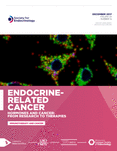Expression and mutational status of USP8 in tumors causing ectopic ACTH secretion syndrome
- Luis G Perez-Rivas1,
- Andrea Oßwald1,
- Thomas Knösel2,
- Kristin Lucia1,3,
- Christian Schaaf2,
- Michael Hristov4,
- Julia Fazel1,
- Thomas Kirchner2,
- Felix Beuschlein1,
- Martin Reincke1 and
- Marily Theodoropoulou1,3⇑
- 1Medizinische Klinik und Poliklinik IV, Ludwig-Maximilians-Universität München, Munich, Germany
- 2Institute of Pathology, Ludwig-Maximilians-Universität München, Munich, Germany
- 3Department of Endocrinology, Max Planck Institute of Psychiatry, Munich, Germany
- 4Institute for Cardiovascular Prevention, Ludwig-Maximilians-Universität München, Munich, Germany
- (Correspondence should be addressed to M Theodoropoulou; email: Marily.Theodoropoulou{at}med.uni-muenchen.de)
Dear Editor,
One of the most common paraneoplastic syndromes is the ectopic ACTH secretion syndrome (EAS), a sustained hypercortisolism driven by tumors of extra-pituitary origin that secrete either adrenocorticotropic hormone (ACTH), its precursor proopiomelanocortin (POMC, unprocessed or partially cleaved) or, less frequently, corticotropin-releasing hormone (CRH). Bronchial carcinoids and small cell carcinomas of the lung (SCLC) are the most frequent causes of EAS (Alexandraki & Grossman 2010). This syndrome is commonly associated with an increased risk of morbidity and mortality since patients with hypercortisolism usually exhibit worse response to chemotherapy and suffer from severe infections and metabolic complications during treatment (Terzolo et al. 2001).
The mechanisms underlying the ectopic production of ACTH are still not well understood. Recently, we and others have reported that the gene coding for the human ubiquitin-specific protease 8 (USP8) is recurrently mutated in 50% of all the investigated ACTH-producing corticotroph adenomas causing sporadic Cushing’s disease (Ma et al. 2015, Perez-Rivas et al. 2015, Reincke et al. 2015). Mutant USP8 triggers POMC transcription and ACTH secretion through the stabilization of the epidermal growth factor receptor (EGFR) (Reincke et al. 2015). As USP8 mutations are considered causative for Cushing’s disease, we investigated whether USP8 is involved in the ectopic production of ACTH by endocrine tumors.
Therefore, we performed a retrospective, single-center analysis using formalin-fixed, paraffin-embedded samples of 15 patients (7 females and 8 males) who developed EAS and were treated and followed up in our hospital since 1986. Patients were included when presenting with persistent ACTH-dependent hypercortisolism (Cushing’s syndrome) of confirmed non-pituitary origin. Cushing’s syndrome was diagnosed based on the clinical signs and symptoms of hypercortisolism (easy bruising, facial plethora, proximal muscle weakness, purple striae, low-impact bone fractures, mood changes, irregular menstruation, infertility or impotence, hypokalemic hypertension, myopathy and hyperglycemia) together with increased levels of late-night salivary …












